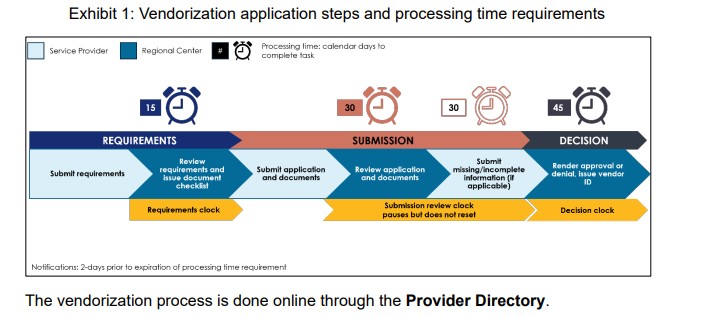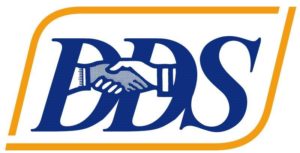Vendorization Rollout in Provider DirectoryBeginning January 19th, 2025, North Bay Regional Center will begin using the Provider Directory
To apply for all other service types/codes, please use the below Letter of Intent through 02/28/25. Starting on March 1, 2026, NBRC, must begin using the Provider Directory for new vendorizations. For guidance, contact vendorization@nbrc.net between January 19, 2025 and March 1, 2026. Effective on and after July 1, 2026, Purchase Reimbursement (Service Code 024) |
How to Become a Service Provider/Vendor
Service providers must be vendored by a regional center before they can provide and be reimbursed for services. The following describes how to become a vendored service
provider.
What is Vendorization?
“Vendorization” is the term used to describe the approval process to provide services through regional centers to individuals with intellectual and developmental disabilities.
You apply for vendorization online through the Provider Directory. This is where you will submit required information and documents, communicate with regional centers, and track your progress.
Your application will be reviewed by the vendoring regional center – the center responsible for the geographic area (also known as catchment area) where your site-based service or operating office is located. The regional center will review your documents and determine if you meet the requirements. If approved, you’ll be assigned a vendor number and a service code in the Provider Directory.
Who Can Apply?
- Potential New Providers: People or agencies who want to start offering
services and supports to Californians with intellectual and developmental
disabilities. - Existing Providers: Providers who want to add new services or expand to new
areas. - Family Members or Guardians: People supporting individuals through the
provision of specific services agreed upon by the individual program plan team.
Who Cannot Apply in the Directory?
Entities seeking to provide service to individuals in the Self-Determination Program cannot apply in the Provider Directory, except for Financial Management Services (FMS) service codes 315-317.
When should you apply for vendorization in the Directory?
Applicants can start a vendorization application at any time. However, if applying for an emergency vendorization or applying for vendorization of certain specialized facilities through the Community Placement Plan (CPP) or Community Resource Development Plan (CRDP) project, contact [regional center] to learn how to begin your application process and when to create your login profile to apply in the Provider Directory.
How can I prepare?
You must determine what service type you are planning to provide and understand applicable statutes, regulations and directives issued by the Department of Developmental Services based on your experience and expertise. The Department of Developmental Services is governed by Title 17 Division 2 of the California Code of Regulations (CCR). Vendorization is governed by Title 17, Division 2, Chapter 3,
Subchapter 2.
These rules explain:
- What services regional centers can fund
- What providers must do to qualify
- How the vendorization process works
- What is required to maintain your vendorization
- The commonly used terms you need to know
To learn more about services offered through regional centers, visit the Regional Center Services and Descriptions webpage on the Department of Developmental Services’ website.
What are the Steps to Apply?
Vendorization application steps and processing time requirements
Step 1: Create or login to existing Provider Directory Profile
Open browser and type https://caddsprod.servicenowservices.com/spd
- If your business is new to the Provider Directory, create login profile.
- If your business is in the Provider Directory, login with existing credentials.
Step 2: Submit requirements
- Submit information to show you meet the minimum requirements.
- The regional center will review your request within 15 calendar days.
Step 3: Submit application
- If you meet the basic requirements, you’ll be asked to submit additional information and documents to support your application.
- When all requested information is received, the regional center will review your application for completeness within 30 calendar days.
- If anything is missing or incorrect, you’ll have 30 calendar days to submit it. The submission review timeline/clock pauses for the regional center during this time and does not reset.
Step 4: Receive decision
- When the application is complete, the regional center will review the application
- The regional center will make a vendorization decision within 45 calendar days.
- If approved, you’ll receive a vendor number.
- If not approved, you’ll receive a denial notice with rights to appeal the decision.
Who Can Use Vendored Providers?
Once vendored, a service provider may be utilized by other regional centers, known as “user” or “utilizing” regional centers, as well as the originally vendoring regional center. NOTE: The vendor identification number assigned by the vendoring regional center must be used by all regional centers purchasing the vendored service.
Do you need help?
For on-demand resources, such as step-by-step guides, FAQs, and an overview of the vendorization process, go to the DDS How to Become a Vendor web page. If you have questions or need help with the process, contact us at vendorization@nbrc.net . We’re here to support you every step of the way.
Important Note About Vendorization
Pursuant to Title 17 of the CCR section 54322(d)(10), vendorization does not guarantee that individuals will be referred or placed with a vendored provider.
NBRC’s Priorities for Service Development
NBRC’s Priorities for Service Development Fiscal Year 2025-26
A Community Resource Development Plan (CRDP) is developed by each regional center in California with stakeholder input. This plan will be used to develop new resources for individuals with developmental disabilities living in the community.
NBRC gathered stakeholder input via survey and needs assessments to determine the DRAFT local priorities below, for the development of NBRC’s Community Resource Development Plan:
- Affordable Housing
- Specialized residential services for individuals with unique needs
- Day Services for individuals with behavioral service needs
- Employment Services
- Forensic Services
- Dementia Services
NBRC will submit its 2025-26 fiscal year Community Resource Development Plan to the Department of Developmental Services by September 15, 2025. Once the plan is approved by the Department of Developmental Services, NBRC will publish the plan and Requests for Proposals asking service providers to develop new services to meet these priorities.
Community Resource Development Plan
FY 22/23 NBRC’s Local Priorities
A Community Resource Development Plan (CRDP) is developed by each Regional Center in California with stakeholder input. This plan is used to develop new resources for individuals served by our Regional Center. For FY 22/23, NBRC surveyed families, clients, staff, and vendors to gather additional input on service needs that NBRC should develop in 2023 and beyond. This year NBRC received 588 responses resulting in the below priority areas for NBRC’s Community Resource Development Plan.
FY 22/23 NBRC Resource Needs for Local Priorities:
Adult Services: 39.46%
Early Start Services: 29.76%
Children & Family Services: 20.92%
Target Population: 0-3yrs
*Infant Development Programs
*Speech
*Individualized/ Family Training
Target Population: 3-12yrs
*Behavior Therapeutic Services
*Intensive behavior services for children with Autism
*Socialization skills/ training program
Target Population: 13-18yrs
* Socialization skills/ training program
* Behavior Therapeutic Services
* Individualized/ Family Training
Target Population: 18-59
* Independent/ SLS
* Day Services with focus on employment
* Residential license facilities
Target Population: 60yrs ( +)
* Independent/ SLS
* HHA
* Residential license facilities
Last Year Survey Results
For FY 21/22, NBRC gathered stakeholder input via survey and determined the below local priorities for NBRC’s Community Resource Development Plan:
- Day/Employment Programs that focus on competitive integrated employment
- Behavior Therapy for children
- Social Training for teens
- Home Health Care Services for Seniors
- Affordable Housing
- Licensed Residential Homes
- Services that focus on Autism
- Services that focus on Substance Abuse






